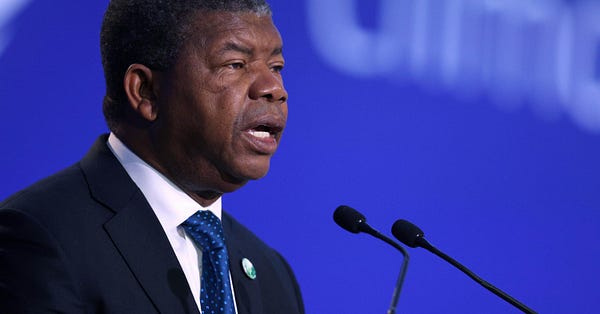Angola Elects 2022 — Issue #3
MPLA mobilises mass election monitoring, as Angolans head to the polls
Welcome back to Zitamar’s Angola Elects newsletter on election day, where our special correspondent Fernando Lima is on the ground in Luanda.

For a good backgrounder on today’s poll, see Fernando’s report for the Associated Press yesterday:


This one-off series of newsletters is brought to you free by Zitamar Consulting, providing blue-chip clients with bespoke reports on Lusophone Africa. Email consultancy@zitamar.com to find out more.
In this issue:
🚶🏿 Angolans off to the polls! Or are they?
🗳 MPLA mobilises for mass election monitoring
📱 No time for reflection in the age of social media
😷 No covid-19 regulations at polling stations
🚶🏿 Angolans off to the polls! Or are they?
Up to 14 million Angolan voters will head to the polls today across the country (and in various locations overseas). In the populous neighbourhoods in Angola’s urban centres, all informal shops, street vendors and roadside alcohol purveyors have been told to close. Today is not a public holiday, but many people — including civil servants — have been given the day off, and the government doesn’t want them using their day off to frequent these establishments rather than actually voting. Formal commerce, in particular the country’s numerous shopping malls, will not be forced to close but the government did instruct their managers to ensure all workers have time to go and vote. In 2017, abstention hit an all-time high of 43%, and this year a high number of voters is again expected to stay away from the polls, despite a serious push to get voters registered.
Abstention rates will be key in this close-run election. Low voter turnout would favour the incumbent MPLA in provinces with strong Unita support (such as Huambo, Bié and Lunda Sul) or strong CASA-CE support (such as Cabinda, Zaire and Namibe). But the ruling party will want civil servants to cast their vote, knowing that in many cases they will be scared that voting for the opposition could somehow cost them their job.
🗳 MPLA mobilises for mass election monitoring
Ruling party the MPLA has announced it will be monitoring the elections in real time via its 53,000-strong list of trained delegates assigned to the 26,443 polling booths across the country and abroad. According to a party apparatchik, as soon as a polling station has filed its final results tally, the delegates will be sent to a special monitoring room in the party headquarters, to follow the results in real time and “fight all sorts of disinformation on results.” Unita has not publicised the exact system that it will use to follow the elections, but the party also has a special team to follow the election results. It is not yet known when official results will be available, but in the past, despite the sophistication of the equipment acquired by election administration body CNE, there have always been inexplicable delays on the publication of results. Several organisations are trying to organise parallel vote counting, as a way of fighting the manipulation of results.
The lack of a coordinated or formalised system for election monitoring by opposition parties will make it much more difficult for them to prove any claims of fraud made against the MPLA following the election. This is of particular concern since multiple recent polls, from organisations such as Movimento Cívico Mudei and AngoBarometro, have indicated that Unita has a strong lead, while the MPLA claims that its own polls indicate it is leading by over 20 percentage points. The highly partisan head of CNE is also unlikely to be keen on hearing complaints from the opposition about election irregularities (see Angola Elects 2022 — Issue 1).
After the elections in 2017, Unita went to Angola’s constitutional court to try and have the election annulled, but was unsuccessful. It claimed that in a number of provinces, the results published had been sent to the provinces from CNE’s headquarters in Luanda, rather than the other way round. Despite widespread concerns of irregularities by opposition parties and civil society organisations, the African Union Election Observation Mission (AUEOM) concluded that it could not find proof of the claimed fraud. There were no EU election observers in 2017, though they are present this time around.
📱 No time for reflection in the age of social media
Traditionally, the day prior to election day is considered “the reflection day” where no political propaganda is broadcast or published in official print media. However, the concept is clearly outdated, given the importance and influence of social networks and cable TV, which makes it almost impossible to control the flow of information entering the houses of Angolan citizens. So, this year, the election campaigners simply halted their mass rallies. The coverage and political messaging has continued across media outlets, showing that times really are changing.
😷 No covid-19 regulations at polling stations
People can vote without a face mask today — a boon for turnout, but a cause for some concern since Angola has only managed to double-vaccinate 20% of its population against covid-19. The health authorities have acknowledged this failure, given the high level of investment made in the vaccination campaign. But Angola is also one of the few remaining African countries that does not allow untested entry for vaccinated visitors, instead forcing all entrants to the country to take a rapid test at the borders, provided free of charge.
The rolling seven day average for new covid-19 cases in Angola is currently very low, according to the covid-19 Data Repository by the Center for Systems Science and Engineering (CSSE) at Johns Hopkins University. As such, it seems unlikely that these elections will constitute a “super spreader event”, although testing capacity in Angola is very low, so there are questions around the validity of the data.

